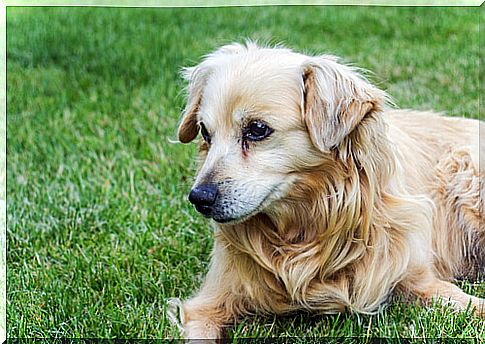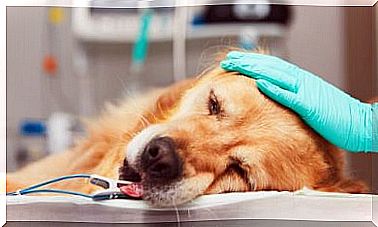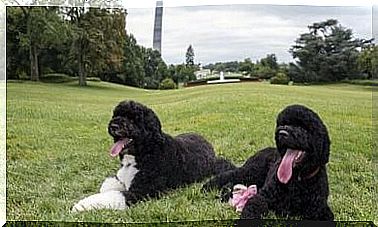Senile Dementia In Dogs: What It Is, How To Treat And Prevent It

Senile dementia in dogs is a practically unavoidable aspect of the natural aging process of our four-legged friends. However, several measures can be taken to improve their quality of life during the old age stage.
The brain is a so – called multi-task organ . It is responsible for the interpretation and coding of external stimuli, transmitting information and messages to other organs. It is a universe of connections and sparks that controls all the metabolic processes of the organism.
A long life is synonymous with many joys and unforgettable moments. But, as in humans as in animals, time leaves its indelible marks. Both in the physical and in the mind or, rather, it affects the speed and efficiency of the cognitive abilities of living beings.
Senile dementia in dogs: what is it?
The term dementia generally refers to memory loss and a decrease in normal brain functions. Aging, of course, implies the presence of signs of dementia which can be more or less evident, depending on the case. The neurons are dying and the brain gradually loses its effectiveness and speed that distinguished him during his youth.

In the case of humans, Alzheimer’s is the brain disease that causes the most severe type of dementia. Neuronal degeneration is so acute that a person can radically change personality and behavior, leading to severe identity disorders.
How does senile dementia start in dogs?
In dogs, dementia is mainly characterized by the progressive loss of sensory functions. Vision and hearing are affected very quickly. The sense of smell, which is the primary sense of dogs, is more resistant.
In particularly advanced cases, the animal also begins to lose cognitive functions. This is actually a logical consequence of the degeneration of the five senses. It is unable to recognize the commands of its master and shows difficulties in spatio-temporal localization.
Although the main cause of dementia is age, there are many factors that can accelerate or even trigger it. Among the most important are: unbalanced nutrition, intoxication, vascular decompensation, trauma or brain damage of various kinds.
Symptoms of senile dementia in dogs
As mentioned earlier, the symptoms of senile dementia in dogs can affect their usual behavior. Dogs usually enter the senior stage between 6 and 10 years of age. Usually, in large dogs, the symptoms of old age appear more quickly.
Dogs can suffer from gradual hearing loss. If you try to call your senior pet but they ignore you, it could be senile dementia and not simple disobedience.
The same can happen with sight. Your four-legged friend will show difficulty walking, fearfully advancing and showing insecurity. Not seeing objects as before, he can end up bumping into or hitting them, not being able to avoid them in time.
Loss of sensation
Quite quickly, the animal loses sensitivity. The reactions to external stimuli such as noise, odors and the presence of other animals decrease. He also shows difficulty in noticing people in his environment.
The progress of dementia is accompanied by the following symptoms :
- Changes in temperament.
- Hyperactivity or anxiety.
- Lack of appetite.
- Fatigue, lethargy and depression.
- Inability to control physiological needs.
- Loss of consciousness and random movements.
- Memory loss.
This last point concerns two very frustrating elements for the bosses. Older dogs with senile dementia forget their own name until they no longer recognize loved ones, including their owners.
In any case, we are talking about an illness capable of developing in silence and which is diagnosed at a very advanced stage. For this reason, periodic visits to the vet are essential to be able to check for dementia in time and act in a timely manner.
How to treat senile dementia in dogs
Nothing can prevent aging. But at least you can count on palliative treatments to limit neuronal degeneration and improve your pet’s cognitive functions.
The veterinarian can administer so-called monoamine oxidase inhibitors (MAOIs). These drugs have a neuroprotective action, as they reduce the action of free radicals.

Additionally, natural Ginko Biloba extract can be used . This treatment improves brain oxygenation and helps promote cognitive function.
It is worth remembering that the vet is the only accredited professional to be able to recommend appropriate medicines and therapies. Avoid self-medication and be wary of any miracle cure.
How to prevent senile dementia in dogs
To be able to reach the third age in good health, it is necessary to adopt good habits from an early age. This eliminates the risk factors that lead to an acceleration of the senile dementia process in dogs.
A balanced diet, regular exercise and outdoor activities are very effective preventive measures. Follow the vaccine calendar scrupulously and carry out normal anti-parasitic treatments frequently.









